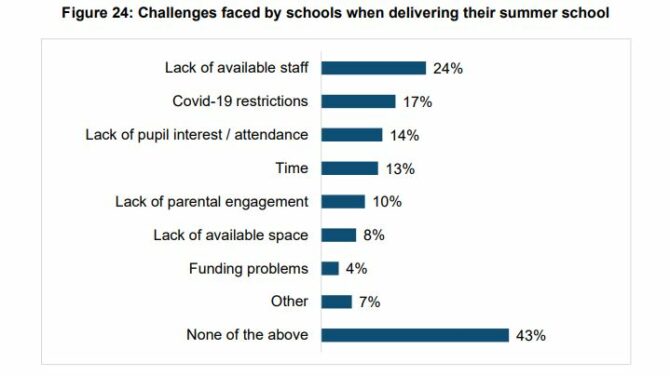Most participating schools hosted just one week of Covid summer school last year – with less than a third running for the two weeks funding allowed, new figures reveal.
The Department for Education today released its final research report into the 2021 programme which revealed a lack of available staff and ongoing Covid restrictions created challenges for participating schools.
Last year the government provided a £200 million funding pot for secondary schools to “run a one or two-week summer school” to help make up for lost learning and aid pupils’ transition between different schools and year groups.
In total, 2,755 schools have completed a claim form for the programme with over 336,000 pupils attending.
Just under eight out of 10 secondary schools participated nationally.
Analysis found that 67 per cent of these schools delivered up to five days of summer school, while 28 per cent delivered between six and 10 days.
A small proportion, four per cent, provided over 10 days.
Just over half of schools indicated they had faced challenges in delivering their summer school. The most commonly cited reasons were a lack of available staff (24 per cent) and Covid restrictions being in place (17 per cent).

Nine out of 10 schools cited staff availability as a factor influencing the planning of the programme. Sixty-five per cent also noted the cost of the programme influenced planning.
The report found schools also reported difficulties in planning when interviewed by researchers.
It states: “As the funding was retrospective and based on the numbers attending, concerns were raised about recruitment and attendance.”
Researchers found one school offered transition pupils a Chromebook laptop as “an incentive for attending”.
Schools also reported a “sense of reluctance to run holiday ‘recovery’ clubs . . . because both pupils and staff were exhausted and needed a break”.
Over two-thirds of participating schools, 69 per cent, were academies.
Summer schools ‘extremely’ effective in improving transition
The report states that 94 per cent of schools believe their summer school programme was very or extremely effective in improving transition between academic years.
Researchers noted the focus of most summer schools “was clearly on pupils transitioning into year 7”. These pupils accounted for two-thirds of all those participating.
Around nine in 10 schools said year 7 pupils attended their summer school.
Ninety-four per cent of schools also said the programme was very or extremely effective in improving wellbeing.
Just 30 per cent said it was very or extremely effective at improving academic attainment. However just under half of schools said it was “moderately” effective in improving this area.
One in ten pupils attend summer school
The DfE also released findings from its Parent, Pupil and Learner Panel (PPLP) this morning.
Around one in 10 secondary school pupils said they attended a summer school. Attendance was higher among pupils with special education needs, identified as child in need, or eligible for free school meals.
In keeping with findings from the summer school report, 80 per cent of parents agreed that attendance at summer school “helped their child feel more ready to return to school” for the next academic year.
Similarly, around seven in 10 pupils said it helped them feel more ready to return.















Your thoughts